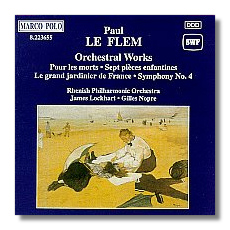
The Internet's Premier Classical Music Source
Related Links
- Latest Reviews
- More Reviews
-
By Composer
-
Collections
DVD & Blu-ray
Books
Concert Reviews
Articles/Interviews
Software
Audio
Search Amazon
Recommended Links
Site News
 CD Review
CD Review
Paul Le Flem

Orchestral Works
- "The Great Gardener of France" (1942)*
- 7 Pieces "For Children" (1912)
- Symphonic Poem "For The Dead" (1920)
- Symphony #4 (1972)
Rhenish Philharmonic Orchestra/James Lockhart, Gilles Nopre*
Marco Polo 8.223655 (Naxos) 63min
This largely forgotten French composer lived 103 years and died as recently as 1984. Shortly before the turn of this century, Le Flem studied at the Paris Conservatory with Widor and Lavignac. In 1904, he entered the Schola Cantorum where his teachers included D'Indy and Roussel - both of whom would have a profound influence on the budding young composer. Eventually, Le Flem replaced Roussel as the Schola's professor of counterpoint. Before the First World War, Le Flem produced several major works, including his First Symphony, a Fantasy for Piano and Orchestra, and an opera. The war temporarily put an end to his compositional activities, and in its aftermath he devoted himself to music criticism and choral conducting. In 1938, he began composing once more. Three additional symphonies and a second opera followed before his final retirement in 1976. As a critic, Le Flem always found the experiments of his younger colleagues fascinating, though his own music remained stubbornly tonal to the end. According to Grove's Dictionary: "His early works have a gracious melancholy that reflects the landscape of his native Brittany; this quality continued to form an important constituent of his music." The earliest pieces in this collection mirror the impressionism of their time, while the most recent score (Symphony 4, 1971-2) reveals a penchant for the spiky harmonies and clean lines of the great French neo-classicists.
The most attractive works here are For the Dead and the seven Children's Pieces, both originally written in 1912 and orchestrated some years later. Two of the composer's children died young, and For the Dead is dedicated to their memory. It is a tender and moving elegy, rather than the sorrowflament that one might expect under the circumstances. The wind sonorities of the opening bars and the solemn atmosphere strongly suggests Ravel's orchestration of Debussy's Sarabande. A gentle lullaby first introduced by the horn at 5:08 is especially touching. The modal melodies of the slower numbers in the Children's Pieces look ahead to the string orchestra pieces in William Walton's score for Olivier's Henry V, and the haunting oboe melody in IV will not soon be forgotten by those fortunate enough to hear this disc. This simple, yet inventive score deserves to be at least as well known as Bizet's Children's Games.
Le Flem composed the music for Jean Tedesco's short film The Great Gardener of France in 1942. The original was scored for a chamber ensemble of 17 musicians, but it sounds as though a full orchestra has been employed here. The thematic material is generally anonymous and bland, though the orchestration is always colorful - an exotic duet for oboe and flute at 8:09 is just one example. While this music may have served its purpose admirably in the film, it rapidly becomes boring without the support of the visual imagery.
Michel Fleury's notes lead one to expect that Le Flem's Symphony 4 is a very dissonant, modern, and abstract work, perhaps along the lines of an Elliott Carter score. Nothing could be further from the truth. Indeed, this Symphony is not far removed in spirit from the D'Indy 2nd or Roussel 4th. It is both more concentrated and less discursive than the Gardener film music. There is some mild dissonance, but melody is still the dominant element. Scoring is richly colorful and transparent. Bitonality is employed gently, as in the most attractive works of Milhaud. Thematic material is compressed, but never abandoned entirely. Snippets of melody pass by in rapid succession and through constantly shifting timbres. I sincerely doubt that Le Flem's teacher, Roussel, would have found anything shocking or surprising here. Only the chattering, seven and one-half minute finale overstays its welcome.
The performances are about as good as we've come to expect from Marco Polo. The Rhenish Philharmonic is competent enough, though its strings are thin, tentative, and not always uniform in pitch. Of the two conductors, Lockhart makes the best impression. He effortlessly conveys the gentle warmth of the two early pieces as well as the virile energy of the Symphony. In contrast, Nopre's reading of the film score is undistinguished.
Easily recommended to anyone with an interest in 20th century French orchestral music from slightly off the beaten path.
Copyright © 1996, Tom Godell


















